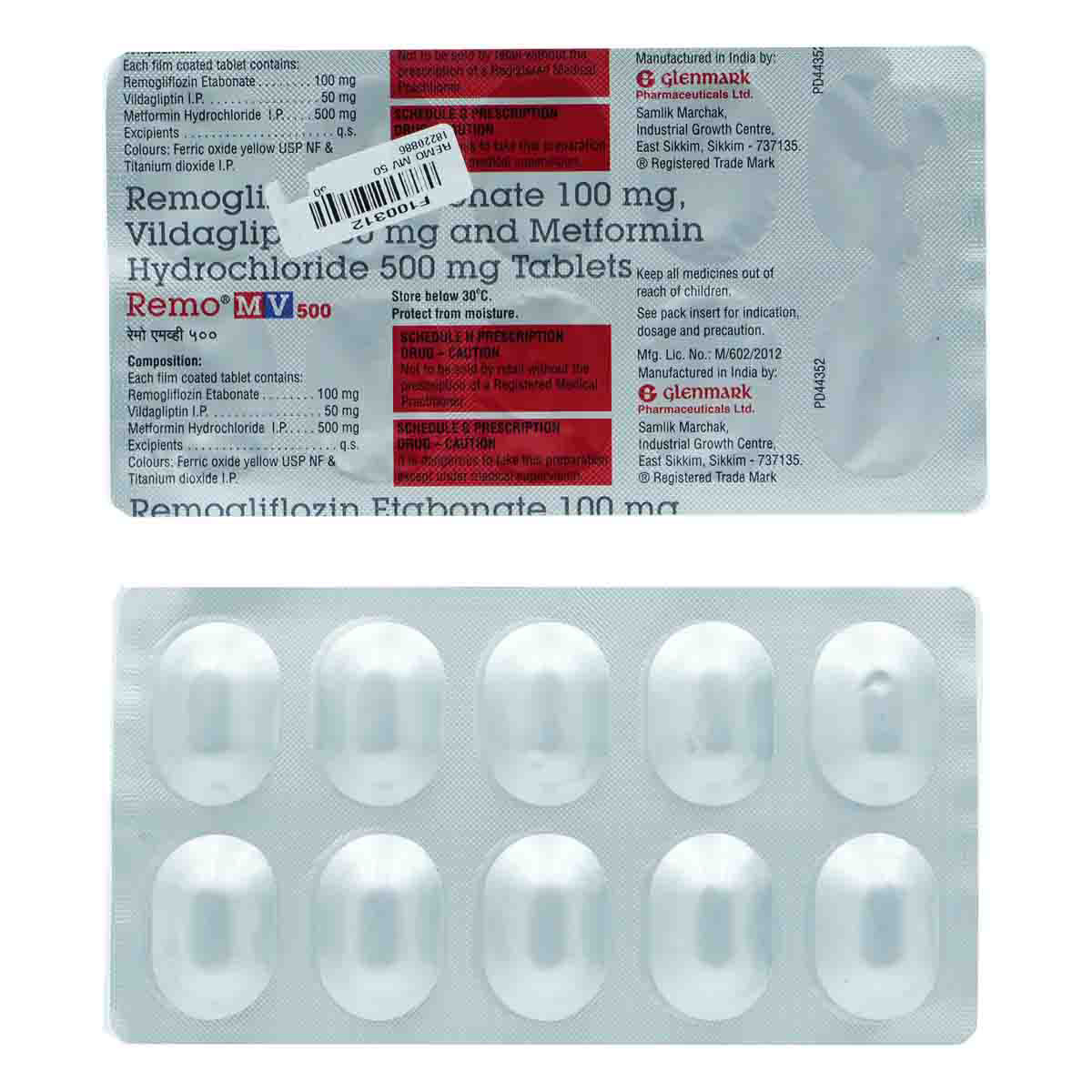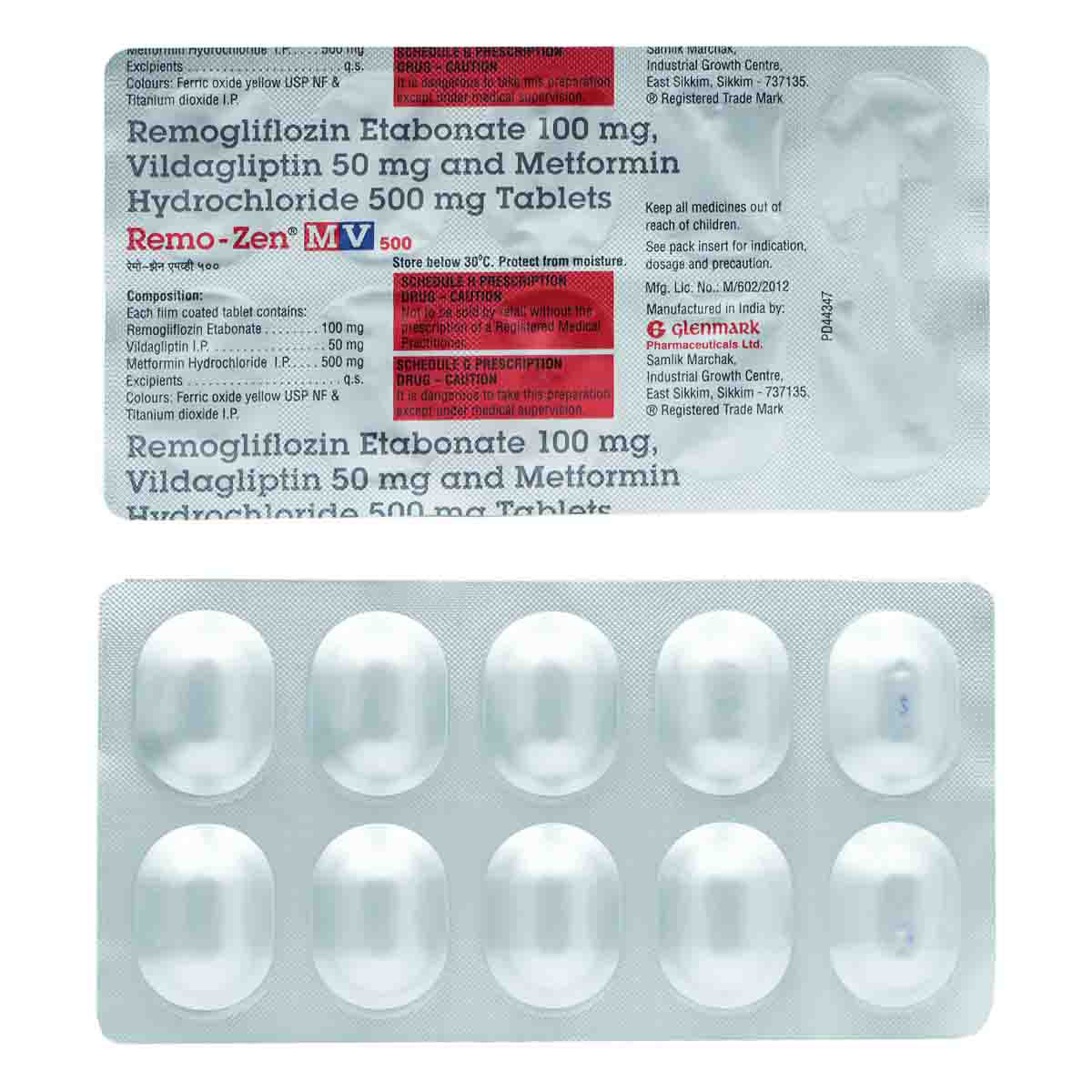METFORMIN+VILDAGLIPTIN+REMOGLIFLOZIN
About
METFORMIN+VILDAGLIPTIN+REMOGLIFLOZIN used to treat type-2 diabetes mellitus adjunct to diet and exercise. Type-2 diabetes mellitus is also known as non-insulin-dependent diabetes or adult-onset diabetes. It is a medical condition in which blood glucose levels are above normal due to insulin deficiency, insulin resistance, or both.
METFORMIN+VILDAGLIPTIN+REMOGLIFLOZIN contains Remogliflozin, Vildagliptin and Metformin. Remogliflozin etabonate helps in removing excess sugar from the body via urine. Metformin works by reducing the sugar production by cells in the liver and delays sugar absorption from the intestines. Also, it increases the body’s sensitivity to insulin. Vildagliptin works by decreasing the hormones that raise blood glucose levels and increasing insulin release from the pancreas. Together, METFORMIN+VILDAGLIPTIN+REMOGLIFLOZIN helps control blood sugar levels.
METFORMIN+VILDAGLIPTIN+REMOGLIFLOZIN should be taken as advised by your doctor for a period prescribed for you, depending on your medical condition. This medicine may cause certain common side effects such as stomach upset, hypoglycaemia, nausea, and vomiting. Most of these side effects do not require medical attention and will resolve gradually over time. However, if you experience these side effects persistently, consult your doctor on priority.
METFORMIN+VILDAGLIPTIN+REMOGLIFLOZIN should be avoided if you are allergic to any of the components in it. Consult your doctor if you are pregnant or breastfeeding. Avoid alcohol consumption while taking METFORMIN+VILDAGLIPTIN+REMOGLIFLOZIN as it might cause unpleasant side effects. Inform your doctor about all the medicines you are taking and your health condition to rule out any unpleasant side effects/interactions. METFORMIN+VILDAGLIPTIN+REMOGLIFLOZIN is not recommended for children below 12 years of age as safety and efficacy is not established.
Uses of METFORMIN+VILDAGLIPTIN+REMOGLIFLOZIN
Medicinal Benefits
METFORMIN+VILDAGLIPTIN+REMOGLIFLOZIN contains Remogliflozin, Vildagliptin and Metformin. Remogliflozin etabonate helps in removing excess sugar from the body via urine. Metformin works by reducing the sugar production by cells in the liver and delays sugar absorption from the intestines. Also, it increases the body’s sensitivity to insulin. Vildagliptin works by decreasing the hormones that raise blood glucose levels and increasing insulin release from the pancreas. Together, METFORMIN+VILDAGLIPTIN+REMOGLIFLOZIN helps control blood sugar levels.
Directions for Use
Storage
Side Effects of METFORMIN+VILDAGLIPTIN+REMOGLIFLOZIN
- Stomach upset
- Hypoglycaemia (low blood sugar levels)
- Nausea
- Vomiting
- Diarrhea
- Headache
In-Depth Precautions and Warning
Drug Warnings
Do not take METFORMIN+VILDAGLIPTIN+REMOGLIFLOZIN if you are allergic to any of its components. Inform your doctor if you have heart problems, diabetic ketoacidosis, skin disorder, acute pancreatitis, low blood sugar levels, or kidney or liver problems. Consult your doctor if you are pregnant or breastfeeding. METFORMIN+VILDAGLIPTIN+REMOGLIFLOZIN is not recommended for children as safety and effectiveness have not been established. Avoid alcohol consumption while taking METFORMIN+VILDAGLIPTIN+REMOGLIFLOZIN as it might cause unpleasant side effects. Inform your doctor about all the medicines you are taking and your health condition to rule out any unpleasant side effects.
Drug Interactions
Drug-Drug Interactions: METFORMIN+VILDAGLIPTIN+REMOGLIFLOZIN may interact with anti-diabetic (insulin glargine), diuretic (furosemide), hormone (levothyroxine) and corticosteroids.
Drug-Food Interactions: Avoid alcohol consumption.
Drug-Disease Interactions: Inform your doctor if you have diabetic ketoacidosis, dialysis, skin disorder, acute pancreatitis, or hypoglycaemia (low blood sugar levels).
Drug-Drug Interactions Checker List:
Safety Advice

Alcohol
unsafeAvoid consumption of alcohol during treatment with METFORMIN+VILDAGLIPTIN+REMOGLIFLOZIN as it can lead to unpleasant side effects.

Pregnancy
unsafeIf you are pregnant or planning pregnancy, inform your doctor before starting treatment with METFORMIN+VILDAGLIPTIN+REMOGLIFLOZIN. Your doctor may prescribe this medicine if the benefits outweigh the risks.

Breast Feeding
cautionLimited data available on the effect of METFORMIN+VILDAGLIPTIN+REMOGLIFLOZIN on breastfeeding. Hence, if you are a nursing mother, inform your doctor before taking METFORMIN+VILDAGLIPTIN+REMOGLIFLOZIN. Your doctor may prescribe this medicine if the benefits outweigh the risks.

Driving
cautionIt is not known if METFORMIN+VILDAGLIPTIN+REMOGLIFLOZIN affects your ability to drive. Drive or operate machinery only if you are alert.

Liver
cautionIf you have a pre-existing or a history of liver disease, inform your doctor before taking METFORMIN+VILDAGLIPTIN+REMOGLIFLOZIN. Your doctor may adjust the dose of this medicine or prescribe a suitable alternative based on your condition.

Kidney
cautionIf you have a pre-existing or a history of kidney disease, inform your doctor before taking METFORMIN+VILDAGLIPTIN+REMOGLIFLOZIN. Your doctor may adjust the dose of this medicine or prescribe a suitable alternative based on your condition.

Children
unsafeMETFORMIN+VILDAGLIPTIN+REMOGLIFLOZIN is not recommended for use in children below 12 years of age as the safety and efficacy are not established.
Habit Forming
Diet & Lifestyle Advise
- Eat foods rich in healthy carbohydrates and fibre, fruits, whole grains, and vegetables.
- Try eating food at regular intervals. Do not skip meals. Also, try not to overeat.
- Follow a healthy diet and walk/exercise for at least 45 minutes.
- Maintain a healthy weight by exercising regularly.
- Rest properly, avoid stress by doing meditation or yoga.
Special Advise
- Regularly monitor blood glucose levels while taking METFORMIN+VILDAGLIPTIN+REMOGLIFLOZIN.
- Try not to skip any doses and take METFORMIN+VILDAGLIPTIN+REMOGLIFLOZIN for as long as your doctor has prescribed it for you.
- Always carry a sugary food such as candy or fruit juice and consume them if you experience hypoglycaemia.
- Consult a doctor if you notice sores or signs of infections.
Patients Concern
Disease/Condition Glossary
Type-2 diabetes mellitus: It is also known as non-insulin-dependent diabetes. It is a chronic or lifelong disease that keeps the body from utilizing insulin properly. Diabetes is a medical condition in which blood glucose levels are above normal. People with type 2 diabetes either do not produce enough insulin, or the insulin produced cannot perform its function in the body (insulin resistance). Middle-aged or older individuals are most likely to suffer from type 2 diabetes; hence it is also known as adult-onset diabetes. Type 2 diabetes symptoms include lack of energy, tiredness, frequent urination, excess thirst, dry mouth, blurry vision, constant hunger, weight loss, and itchy skin.
FAQs
METFORMIN+VILDAGLIPTIN+REMOGLIFLOZIN is used to treat type-2 diabetes mellitus adjunct to diet and exercise.
METFORMIN+VILDAGLIPTIN+REMOGLIFLOZIN contains Remogliflozin, Vildagliptin and Metformin. Remogliflozin helps in removing excess sugar from the body via urine. Vildagliptin works by decreasing the hormones that raise blood glucose levels and increasing insulin release from the pancreas. Metformin reduces sugar production by cells in the liver and delays sugar absorption from the intestines. Also, it increases the body’s sensitivity to insulin. Together, METFORMIN+VILDAGLIPTIN+REMOGLIFLOZIN helps control blood sugar levels.
Hypoglycemia/low blood sugar levels could be the side effect of METFORMIN+VILDAGLIPTIN+REMOGLIFLOZIN. Hypoglycemia generally occurs when METFORMIN+VILDAGLIPTIN+REMOGLIFLOZIN is taken along with other antidiabetic medicines, without food or with alcohol. Consume sugary food such as candy or fruit juice if you experience hypoglycemic symptoms such as dizziness, cold sweats, anxiety, or tremor. Regularly monitor blood glucose levels while taking METFORMIN+VILDAGLIPTIN+REMOGLIFLOZIN.
Low-fibre diets, high-fat diets, sugary diets, obesity, smoking, stress, lack of exercise, age, genetic factors, and certain medical conditions are the common causes of diabetes.




